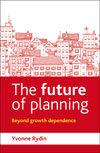The future of planning: Beyond growth dependence

Building on her previous book The Purpose of Planning, which was written before the financial crisis starting in 2008, Yvonne Rydin reconsiders her messages on urban change and the involvement of private development markets, public actors and local communities in city planning from the angle of current and future low economic growth.
The author argues that British planning has been dominated over the past 40 years by a paradigm of growth dependency, which – in the light of social, economic and environmental sustainability – has failed as the sole framework for planning practices. Hence, the purpose of the book is to explain these limitations and explore alternatives that move away from either pure market- or state-led approaches towards a mix that includes community-based activities.
Drawing on governance theories and particularly on concepts of collaborative planning, the book provides an in-depth and critical analysis of the engagement between key stakeholders, and the roles that private- and public-sector stakeholders play in their work with local communities.
The first chapters focus on the problematic of growth-dependent planning and embed the current status quo as well as the possibilities for alternative approaches into historical and economic developments. They also highlight the underlying political and ideological assumptions and how these provide leverage to some actors (private-sector development) while leaving others more vulnerable in times of economic downturn. The author also examines the close link between distributive environmental and social injustice, such as in the case of the promotion of new development for green growth as a way for high-income property owners to shield themselves against negative environmental externalities.
Following that, ways to reform the planning agenda towards just sustainability are proposed, which aim to tackle the inequalities created in the built environment and improve the well-being of urban citizens with their diverse social needs. This agenda requires planners to take on a new role in community engagement and apply a wider set of planning tools and methods.
The proposal for suggested reforms is expanded along specific areas of planning, such as the provision of low-cost rental housing in self-build schemes; the protection and maintenance of buildings and places that are important to people’s lives but have low economic value; and the strengthening of assets found e.g. in churches, local parks and community centres that are valuable particularly to low-income households.
What the book shows are many opportunities to change the current planning system and the work of city planners to improve the quality of life of all households and create a more sustainable future, while highlighting that community-based approaches should not completely replace market-or state-led growth-dependent planning, but complement it. Reforms have to occur in planning policy as well as in the form of community engagement, which should particularly focus on including vulnerable and low-income communities.
Book note prepared by Julia Wesely
Search the Book notes database
Our Book notes database contains details and summaries of all the publications included in Book notes since 1993 - with details on how to obtain/download.
Use the search form above, or visit the Book notes landing page for more options and latest content.
For a searchable database for papers in Environment and Urbanization, go to http://eau.sagepub.com/

